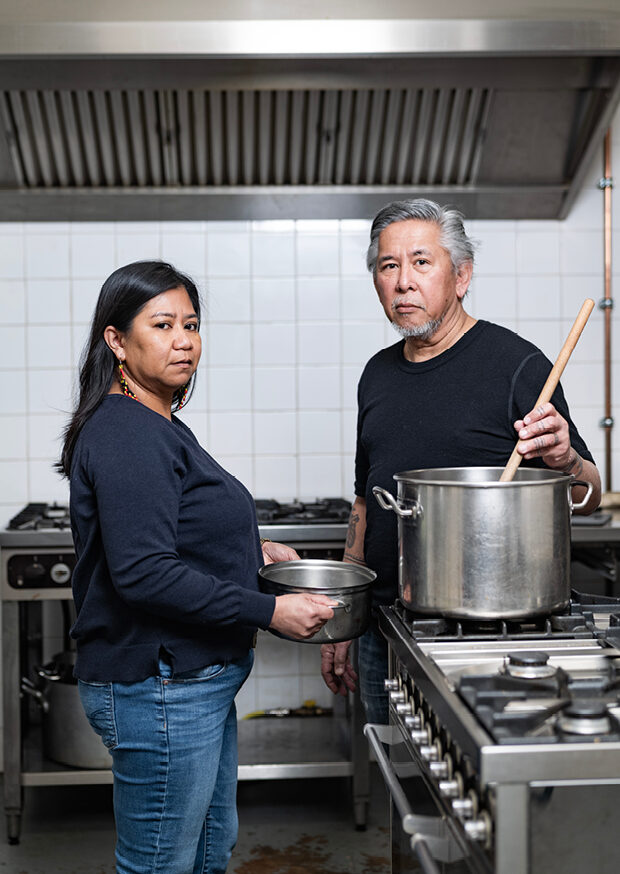“From the locals we raise awareness and mobilization for change in the Philippines and about forced migration. We are campaigning for human rights and social change.”
Meeting Jun Saturay and Eunice de Asis at The Fabriek in the Van Ostadestraat, at the Fabriek – a former squat – during the first day of a two-day conference of Migrante Europe in Amsterdam.
Eunice de Asis, chair of Migrante Amsterdam, states: “We are currently hosting the 4th Congress of Migrante Europe with the theme ‘Filipino Migrants Unite: Jobs at Home, Not Abroad.‘ Different chapters of Migrante Europe have converged in Amsterdam. Over the course of two days, we discuss local and national policies in Europe, the growing xenophobia, and strategies to counter it. Delegates examined how economic amendments to the 1987 Philippine constitution could potentially exacerbate joblessness in the Philippines, leading more Filipinos to seek opportunities abroad and risking undocumented status. We developed new strategies and exchanged knowledge, affirmed our commitment to serve the people. Additionally, we discuss recent issues in the Philippines, the red tagging and abduction of activists. One of our members, who wished to visit her family in the Philippines, was held for three days at the Manila airport jail without access to her rights or a lawyer. This experience has been traumatic for her, her family, and friends. Furthermore, the abduction of Gene Roz Jamil de Jesus, who is the son of one of Migrante members in Bologna, Italy chapter, and his companion Dexter Capuyan, who have been missing for 11 months now, is concerning. De Jesus works as an information officer for a task force dedicated to defending the rights of Indigenous people. It serves as a warning for us, active members of Migrante. It seems we are viewed as unwanted citizens; the red tagging by the current government of the Philippines puts us in danger. How can I visit my family now?”
Migrante was formed to advocate for the rights of Filipino migrants. Migrante gives members information about their rights as workers in host countries and their rights as Filipino citizens outside the Philippines.
Eunice: “We are organized as a self-reliant association, we mobilize ourselves as a community, as a political advocacy and action group. We explain to our members the context of laws in host countries, and inform them about the cheap labor export policies of the Philippines, and what this means for families and migrants. By raising awareness about these contexts, we want them to be in a better position in their decision making process.”
Jun Saturay explains the structure of Migrante: “We need solidarity. That is why we are in multiple networks, in cities and countries, yet connected to the local networks. The network is organized in several chapters going from the city to the global. City chapters, such as Migrante Amsterdam, Rotterdam Utrecht and Den Haag organize the localities, assembling and organizing Filipino migrant workers, family migrants, au pairs, and students in the cities. These city chapters are encouraged to form country chapters, at the same time the city networks should remain connected to local networks to amplify the voices of migrants within the cities, to organise actions, meetings and events.”
“The exchange of situations in different host countries helps to unite and stand stronger against all kinds of human rights violations towards migrants. Whether they are refugees or irregular migrants.“
“If we encounter Racism and Discrimination? Migrants, undocumented people, irregular migrants? Yes.” Eunice says, “We encounter this on a daily basis. Whether it is housing, working, school, how we are approached in public spaces. Undocumented people are without any rights, convicted of modern slavery and the Philippine government’s “Labor Export Policy” acts as a major facilitator, pulling its citizens into the grasp of capitalism despite all the risks involved. People are afraid to report, are afraid to stand up for their rights. As a creative producer I am now part of the communication team of Samen tegen Racisme, I can bring in my knowledge about marginalized communities, how to reach out, and I can inform my community about the possibilities of safe reporting about Racism and Discrimination. We need to work together on multiple issues to be more effective.”
Portrait of Jun and Eunice, by Mona van den Berg
